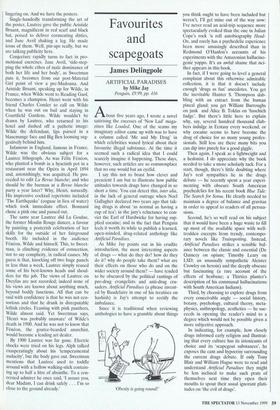Favourites and scapegoats
James Delingpole
ARTIFICIAL PARADISES by Mike Jay Penguin, £9.99, pp. 416
About five years ago, I wrote a novel satirising the excesses of 'New Lad' maga- zines like Loaded. One of the scams my imaginary editor came up with was to have a column called `Me and My Drug' in which celebrities waxed lyrical about their favourite illegal substance. At the time it seemed such a radical idea that I could scarcely imagine it happening. These days, however, such articles are so commonplace that no one would bat an eyelid.
I say this not to boast how clever and prescient I am but to illustrate how public attitudes towards drugs have changed in so short a time. You can detect this, inter alia, in the lack of general outrage when Noel Gallagher declared two years ago that tak- ing drugs is about 'as normal as having a cup of tea'; in the jury's reluctance to con- vict the Earl of Hardwicke for having sup- plied cocaine; and in the fact that Penguin feels it worth its while to publish a learned, open-minded, drug-related anthology like Artificial Paradises.
As Mike Jay points out in his erudite introduction, the most interesting aspects of drugs — what do they do? how do they do it? why do people take them? what are their effects on those who do and on the wider society around them? — have tended to be obscured by the political rantings of pro-drug evangelists and anti-drug cru- saders. Artificial Paradises (a phrase invent- ed by Baudelaire in one of his treatises on hashish) is Jay's attempt to rectify the imbalance.
Since it is traditional when reviewing anthologies to have a grumble about things 'Obesity is going round!'
you think ought to have been included but weren't, I'll get mine out of the way now: I've never read an acid-trip sequence more spectacularly evoked than the one in Julian Cope's rock 'n roll autobiography Head- On, and rarely has a psychedelic experience been more amusingly described than in Redmond O'Hanlon's accounts of his experiments with the Amazonian hallucino- genic yoppo. It's an awful shame that nei- ther appears in this book.
In fact, if I were going to level a general complaint about this otherwise admirable collection, it is that it doesn't include enough 'drugs as fun' anecdotes. You get the inevitable Hunter S. Thompson dab- bling with an extract from the human pineal gland; you get William Burroughs on junk and Alice B. Toldas on 'haschich fudge'. But there's little here to explain why, say, several hundred thousand club- hers indulge in Ecstasy every weekend, or why cocaine seems to have become the drug of choice for so many young profes- sionals. Still less are there many bits you can dip into purely for a good giggle.
Then again, I speak as a lightweight and a hedonist. I do appreciate why the book needed to take a more scholarly tack. For a start, though, there's little doubting where Jay's real sympathies lie in the drugs debate — he recently spent a year experi- menting with obscure South American psychedelics for his recent book Blue Tide: The Search for Soma. He clearly needed to maintain a degree of balance and gravitas in order to appeal to readers of all persua- sions.
Second, he's so well read on his subject that it would have been a huge waste to fill up most of the available space with well- trodden excerpts from trendy, contempo- rary novels like Trainspotting. Instead, Artificial Paradises strikes a sensible bal- ance between the classic and essential (De Quincey on opium; Timothy Leary on LSD; an unusually sympathetic Aleister Crowley on heroin) and the deeply obscure but fascinating (a rare account of the effects of henbane; a Thirties planter's description of his communal hallucinations with South. American Indians).
Third, by choosing to explore drugs from every conceivable angle — social history, botany, psychology, cultural theory, meta- physics, anthropology, aesthetics — he suc- ceeds in opening the reader's mind to a degree which would not be possible given a more subjective approach.
In indicating, for example, how closely drugs informed early religion and illustrat- ing that every culture has its intoxicants of choice and its 'scapegoat substances', he exposes the cant and hypocrisy surrounding the current drugs debate. If only Tony Blair and William Hague were to read and understand Artificial Paradises they might be less inclined to make such prats of themselves next time they open their mouths ft) spout their usual ignorant plati- tudes on 'the evil of drugs'.


























































































 Previous page
Previous page